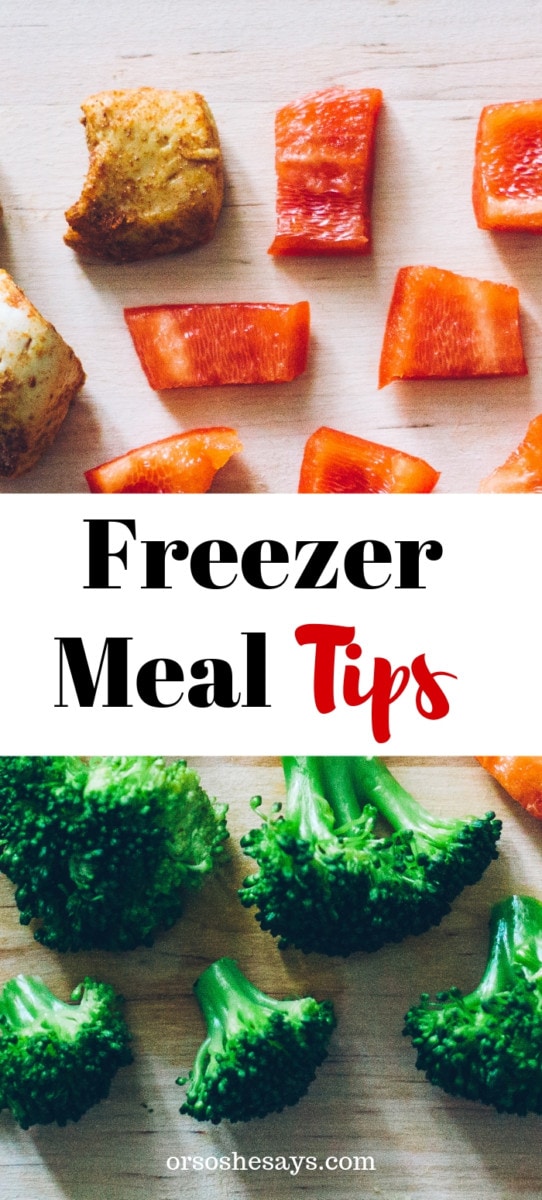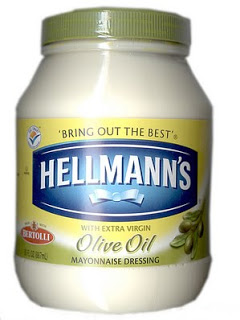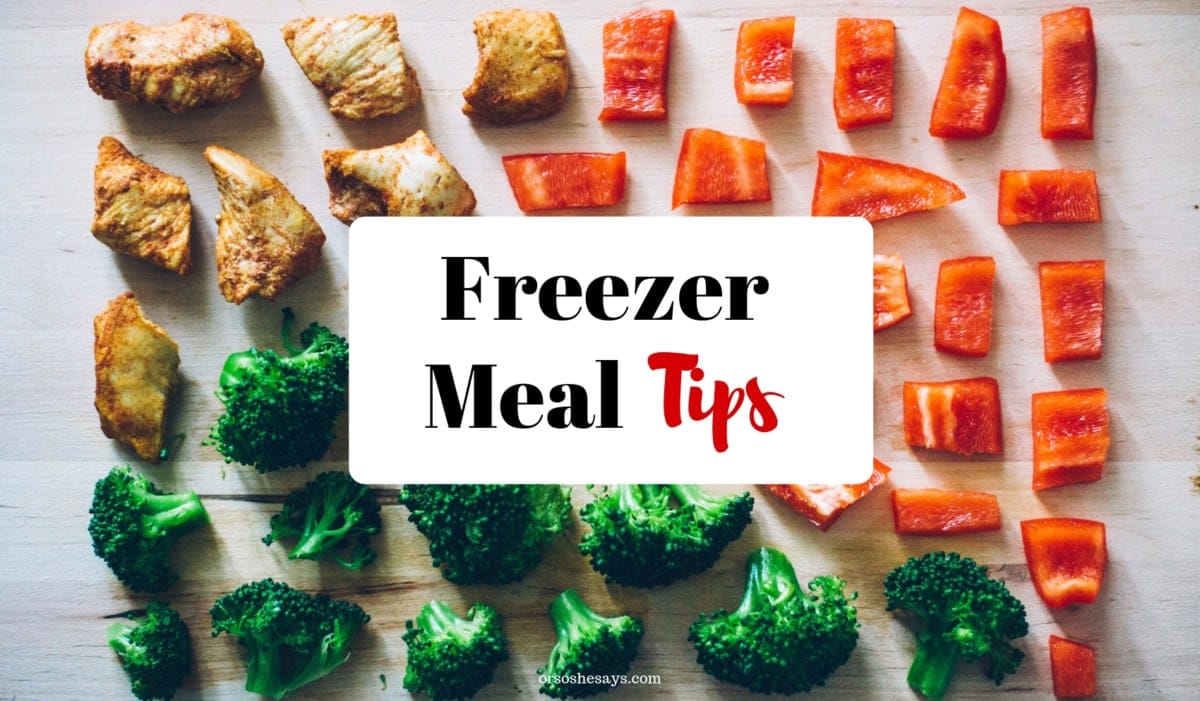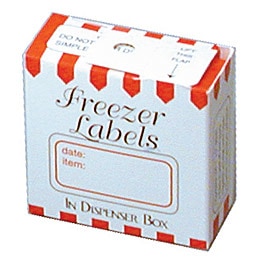Freezer meals are the best!! I’m part of a dinner swap, where every week 3 friends and I each make 4 dinners. Monday we eat the meal we made, and then on Tuesdays we swap the 3 others. So Tuesday, Wednesday and Thursday I have dinners already made. Clean-up is a breeze too! One person is in charge of a freezer meal. That way if we are eating out one night or whatever we can save it for later! I cannot tell you how great it’s been! The tricky part is finding out what foods freeze well, and which ones don’t. Most of my tips come from here.

Freezer Meals
Freezer Meals: Foods That DON’T Freeze Well
– Because of their texture or composition, some food products do not freeze well. While freezing will keep them from spoiling or becoming unsafe to eat, their quality after freezing and thawing may not be acceptable.
– Fruits or vegetables with a high water content or a delicate cell structure do not freeze well. These include lettuce, tomatoes, watermelon, citrus fruit sections and cucumbers. You can freeze some of these foods, like tomatoes, for use in cooked dishes, but they are not like fresh tomatoes when you thaw them.
– Sauces and gravies thickened with flour or cornstarch frequently separate and break down when frozen.
– Modified starches used in commercial frozen foods are not generally available in retail stores. For best results, freeze the stock for gravy unthickened and add thickener when you reheat it.
– Cooked egg whites tend to get rubbery when you freeze them. If you want to freeze a mixture containing cooked egg white, be sure it is finely chopped. The same advice is true for celery.
– Mayonnaise will break down when it is frozen. Use salad dressing instead of mayonnaise when you make sandwiches or salad mixtures for freezing.

– Cakes frosted with butter frosting freeze well, but cooked frosting or fluffy egg-white frosting do not freeze well.
– Well-done pastas may be too soft after reheating. If you want to freeze macaroni, spaghetti, or foods containing these, under-cook the pasta. Cooked chunks of potatoes become soggy or gritty, but mashed potatoes or twice-baked potatoes freeze well.
– You can freeze most natural cheeses with good results, but they may crumble more when you thaw them.
– Yogurt and cultured sour cream will break down and separate.
Freezer Meals: Freezing Basics
– For high quality frozen foods, start with high quality fresh food. Freezing will retain quality, but cannot improve it.
– Work under sanitary conditions. Have all necessary equipment and packaging materials ready before you begin to work with the food.
– Choose packaging materials that will prevent air contact with the food and moisture loss from it. For semi-fluid foods, use rigid plastic or wide-mouth glass containers you can close tightly. For more solid foods, you can use freezer bags, heat-seal able bags, coated freezer paper or heavy-duty aluminum foil. You can reuse plastic containers originally used for frozen foods if you can clean them thoroughly. Do not reuse paper cartons that originally held milk, cottage cheese or similar products.
– Blanch or steam all vegetables and cool them quickly in ice water before freezing. This step inactivates enzymes that will damage flavor, nutrients and texture during freezer storage.You can freeze fruits with or without sugar. Those you freeze with some sugar however, will have better texture and color. Use an antioxidant like ascorbic acid or citric acid to keep light-colored fruits like apples, peaches, or red cherries from discoloring.
– Repackage meats you purchase at the supermarket before freezing them for long-term storage. The wrap used on fresh meats will allow oxygen to contact the surface of the meat. The meat will get freezer burn if you store it in the freezer for more than a few weeks. For short storage, just place the supermarket wrapped meat in a tightly closed plastic bag before freezing.
– Freeze foods as quickly as possible. This helps form tiny ice crystals that will not damage the food as much when it is thawed.
– Be sure to keep the freezer at 0 degrees F or lower to protect food quality.
– Use all products within a reasonable time. Keep an inventory of food in the freezer to help you determine this. As long as food is kept solidly frozen, it will not become unsafe to eat. But it will lose quality during extended storage–nutrients, flavors and appearance will decline.

Containers for Freezer Meals
In general, your containers should have the following characteristics:
Moisture and vapor-proof,
Odorless, tasteless and grease-proof,
Food grade,
Durable and leak proof
Won’t become brittle and crack at freezer temperatures
Easy to use, seal and label
Easy for compact stacking and good use of freezer space
Reasonable cost
I found these at Tupperware
Freezer Meals: Packaging and Labeling
– Cool all food before freezing and packaging. This speeds up the freezing process and helps retain the natural color, flavor and texture.
– Pack foods in quantities you will use for a single meal.
– Pack foods tightly leaving as little air as possible. Air is bad!
– Leave enough space so that when it freezes, it has room to expand.
– Label each package with the name of the product, the packaging date and number of servings. Use freezer tape to label.
– You can get a box of labels at the container store for $4.99
I haven’t had too much of a problem about worrying about this, but some spices do change during freezing.
Pepper, cloves and garlic tend to become strong and bitter.
Onion changes flavor when freezing.
Celery seasoning becomes strong.
Curry tends to have a musty flavor.
Salt tends to lose it’s flavor.
Tip: Season your dishes lightly before freezing, then when you reheat it, add more spices.
Homemade Granola
Buttermilk Pancakes
Black Bean Taco Soup
Hamburger Gravy
Mexi-Burritos
Related post: Learn how to start a freezer meal exchange with your friends and Neighborhood Dinner Co-Op


Thank you!! I love to freeze dinners for later but was never sure how to store it!! Thank you so much and the FYI on a few dinners that work good with it!
Thanks again!
Sweet
I have to add that if you are doing long term freezing tupperware has not been reliable for me. they tend to crack after about one month.
I made the Chicken Pot pie and my family loved it. We ate one and froze the other two. Now I’m just wondering the best way to cook the frozen pies. Should I let them completely thaw before putting them in the oven, or would it be OK to just pop them in frozen? I just worry the crust will burn before the center is cooked. Has anyone tried this? Any thoughts??
Angie,
I’ve yet to make it frozen, BUT I would imagine you can just bake it longer. Covering it with tin foil for part of the time will help prevent the crust from getting too toasty. Maybe cook it uncovered for the actual baking time and then cover it and continue to bake it until done. Hmmm…let me know what you figure out.
These are great tips! A few questions though…
What’s the reason for staying away from glass as a container? Is it because it might crack? Or something with preserving the food?
Also, when you say to cool the food before freezing, does that mean leave it on the counter for a while so you’re not putting it in there piping hot? Or do you mean to put it in the fridge for a while then freeze?
Thanks for the advice!
Daphne- As for storing it in glass it’s more for preventing it from cracking, although plastic has been known to crack too. Cooling the food before freezing it will get rid of any bacteria. I would put it in the fridge. Heat also raises the temp of your freezer, so it won’t freeze as well:0 Good luck!
Love this!!
I want to know more about your dinner swapping. How does it all work?
Here’s a previous post explaining the swap: https://oneshetwoshe.com/2010/02/neighborhood-dinner-co-op.html
Thanks for the ideas
I love this idea!
My cooking group is starting our 6th year of cooking together tomorrow! We cook one day each month, rotating homes throughout the year. The hostess choses the menu- always 12 freezable meals for each family- and does all of the shopping and planning. We cook together, prepping and preparing all 48 meals for the freezer. We enjoy mimosas and wonderful time together and go home with 12 meals for the month. It is by far the most enjoyable, productive day of the month. We always make a few extra meals to share with families that might need a meal in our neighborhood. Our meals usually feed a family of six so we have leftovers too. Happy Cooking!
W
Wow! I’m SO impressed! If you ever want to take some pictures of your event and do a guest post, I would looooooove it!
_____
Great information. Some I didn’t know or had never tried. I do love to have things in the freezer.
I almost always use glass (I’m kinda anti-plastic! ;)) and I’ve never had a problem! I’ve used plastic before and I’ve had some shatter, but never my glass containers.
I’ve only had a problem with my glass once. Just when my little kids climbed on my food storage shelf, that was already overloaded. We had a little mess, to say the least. But, it’s not to say that plastic containers wouldn’t break too. Thanks for the comment!
Yes! Thank you! Glass only here as well. I am on a mission to get all the plastic out of this house! And I have never had a problem with freezing in glass.
I found you on pinterest. I loved the pic of the well organizes freezer, but I would have loved even more the shopping list and dish how to’s that those turned into…..
How do you Blanche veggies??
My only thought is if you would be worried about the crust on top, put tin foil over it and take it off about 20 min before taking out of the oven. The tin foil saves the top from burning at all and helps cook it all the way through. If you throw it in frozen it will take a lot longer, so it depends on if you have the time to bake it or not. I don’t think it will matter either way, but I would say frozen just in case. This is having no experience with pot pies, but having experience with other pies. Good luck 🙂
I’m going to start doing freezer meals and I’ve pinned all your recipes!! This post is awesome and I’m sure I’ll be referring to it often…thanks so much 🙂
For sure! Thanks for stopping by, Erin!
Excellent ideas. I actually just use freezer date labels that have the month printed on them. Fast and easy and you will never forget. Either way freezer labels will help you stop wasting food.
I haven’t really done any freezer meals or anything before, but have decided to try some. I’m really glad I found your page with all these helpful suggestions–I’ll be referring to your tips again! Thanks!! 🙂
Thanks for the sweet comment, Kaitlyn! Good luck!
Thanks for sharing the recipe….I’ve been doing freezer meals from the Once A Month Cookbook for over 18 years. Sorry to the lady who has cracked her Tupperware. I used to sell, 19 years ago, and if you’re using the purple FREEZER line, you shouldn’t have a problem. Though some of mine have cracked – but that was because they were dropped while taking out of the freezer. Even then, they had to hit just right.
A word of caution for those that are trying to eat healthy though! Any time you freeze breads, you will kill the Vitamin B’s in it. B’s are for nerve and muscle health. I have Fibromyalgia, so this is important to me. I usually go with stuffings that I add to a filling that was frozen. Or make my own pizza crust and breads and top with items from my freezer. If I have to eat a recipe with frozen breads, I make sure that it is surround on the calendar with other items that are fresh.
Thank you so much! I’ve added this to my Pinterest board for freezing meals. Super helpful.